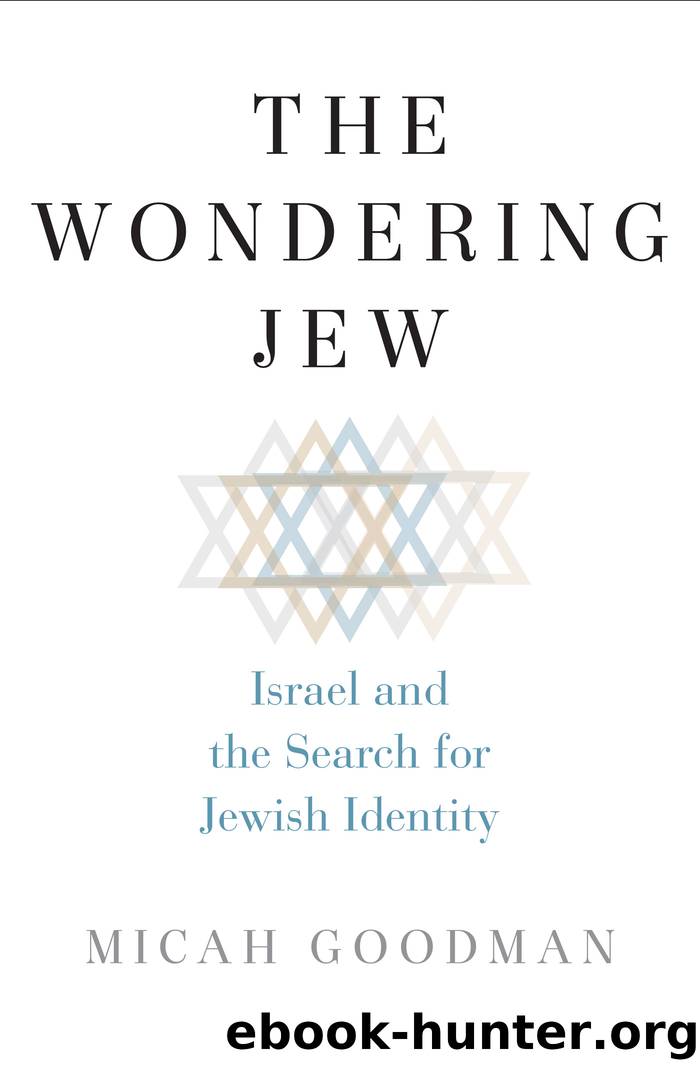The Wondering Jew by Micah Goodman

Author:Micah Goodman
Language: eng
Format: epub
Publisher: Yale University Press
Published: 2000-11-15T00:00:00+00:00
10 PARALLEL WORLDS, PARALLEL DIVISIONS
The debate between Micha Josef Berdyczewski and Ahad Haâam was an argument over the soul of Jewish secularism. They espoused two contradictory ways of thinking. Berdyczewski argued that the new secularism must sever itself from the tradition, Ahad Haâam that the role of secularism was to revitalize the tradition. This debate runs parallel to a debate over the soul of Jewish religiosity. Some say that the Jewish religion must withdraw from the outside world, others that a genuinely profound religiosity should be open to the world and engaged in it. These two positions represent different interpretations of the foundational idea of Religious Zionism. But this debate is much greater than Religious Zionism. In reality, these are two ways of thinking that have clashed throughout the whole history of Jewish thought. To truly understand their depth, we need to put aside the modern frame of reference used in earlier chapters and return to the Middle Ages.
I first read Maimonidesâ Eight Chapters when I was eighteen, as I was beginning to develop an interest in Jewish thought. The book, I found, contained profound ideas about human nature and a wealth of intelligent, helpful, even illuminating psychological insights. Five years later, when I was a philosophy student at the Hebrew University of Jerusalem, I delved into a different book, Aristotleâs Nicomachean Ethics. It was an enjoyable and edifying read, but the concepts that Aristotle laid out were familiar to meâtoo familiar. To my astonishment, I found that almost all the psychology I had learned from Maimonides was already present in Aristotle. This surprised and troubled me greatly. It was obvious that Maimonides had taken the ideas he presented in Eight Chapters from Aristotleâs Nicomachean Ethics, but why had he not attributed them to their proper author? Why had he not mentioned Aristotle by name? I reread Eight Chapters and noticed something in the introduction that I had failed to spot the first time. Maimonides admits to his readers that the ideas he presents are not his own:
Know, however, that the ideas presented in these chapters and in the following commentary are not of my own invention; neither did I think out the explanations contained therein, but I have gleaned them from the words of the wise occurring in the Midrashim, in the Talmud, and in other of their works, as well as from the words of the philosophers, ancient and recent, and also from the works of various authors, as one should accept the truth from whatever source it proceeds.1
Maimonides knew what would happen if he told his conservative readers that the wisdom he was imparting to them came from Aristotle, a Greek. He knew they would probably reject it. The sad irony was that in order to introduce Jews to Aristotleâs thought, Maimonides had to hide from them that it was Aristotleâs. Maimonides was not like his readers. He did not believe that a personâs attitude to ideas should be affected by their provenance. The truth must be heard, he wrote, âfrom whatever source it proceedsââno matter who said it.
Download
This site does not store any files on its server. We only index and link to content provided by other sites. Please contact the content providers to delete copyright contents if any and email us, we'll remove relevant links or contents immediately.
| Africa | Americas |
| Arctic & Antarctica | Asia |
| Australia & Oceania | Europe |
| Middle East | Russia |
| United States | World |
| Ancient Civilizations | Military |
| Historical Study & Educational Resources |
The Battle of Mogadishu by Matt Eversmann & Dan Schilling(754)
The Confidence Men by Margalit Fox(710)
The Spymaster of Baghdad by Margaret Coker(676)
A History of the Muslim World since 1260: The Making of a Global Community by Vernon O. Egger(672)
Jack the Ripper and the East End by Peter Ackroyd(636)
Empire of Fear: Inside the Islamic State by Andrew Hosken(623)
The Afghanistan File by Prince Turki AlFaisal Al Saud(614)
Akhenaten by Dominic Montserrat(610)
Islam At The Gates: How Christendom Defeated the Ottoman Turks by Diane Moczar(608)
The Crimean War by Winfried Baumgart(603)
The Jerusalem Diamond by Noah Gordon(595)
Beirut 2020 by Charif Majdalani(593)
The History of Jihad by Robert Spencer(587)
A Concise History of Greece (Cambridge Concise Histories) by Richard Clogg(584)
The Privatization of Israeli Security by Shir Hever(561)
Enemy in the East by Rolf-Dieter Müller(560)
Israel: Ancient Kingdom or Late Invention? by Daniel I. Block(557)
The Nine Lives of Pakistan by Declan WALSH(553)
Destroying a Nation: The Civil War in Syria by Nikolaos van Dam(549)
